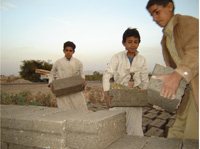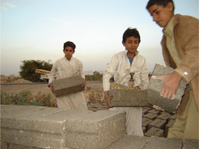
Yemen plans to protect children from hazardous jobs [Archives:2008/1133/Front Page]
February 28 2008
 |
SANA'A, Feb 27 ) Sexual harassment, drowning at sea and exposure to pesticides are the main risks facing Yemeni child laborers, said an expert from the Yemeni Ministry of Social Affairs & Labor.
In 2004, the ministry defined a list of 72 hazardous forms of work which Yemeni children should be banned from doing, according to Mona Salem, director of the Combating Child Labor Unit in the ministry. The restricted work includes working in agriculture where children are exposed to pesticides, handling heavy agricultural equipment and carrying heavy loads; construction, where children are exposed to chemical toxins and paint; and car repair workshops, where children face physical injuries, burns and respiratory problems from inhaling fumes.
“In Yemen, the most frequently reported cases came from children who work in motels and restaurants, where they have to work at night and are sexually harassed by passengers and qat chewers,” said Salem.
Salem also mentioned reports about many Yemeni children in coastal areas working in the fishing sector who drown and die. Most of the cases came from Aden, Al-Mukalla, and Al-Hodeidah, where fishing for profit is common.
Salem also pointed out the high number of reports confirming the medical risks that Yemeni children face when working on farms, such as exposure to pesticides that impact their lungs.
She confirmed that Haja'a, Sana'a, and Dhamar are the three governorates in Yemen where children most often work in dangerous fields. “Most of the children in Sana'a and Dhamar work on qat and potato farms where they use pesticides that have fatal health effects on them,” Salem said. “In Haja'a, the children who work on mango farms are affected by prolonged exposure to pesticides.”
There has been no recent survey about the number of child laborers in Yemen. An estimated 700,000 Yemeni children aged 6 to 14 years old work. However, this estimate, based on the 1999 Yemen Poverty Monitoring Survey, did not report specifically on the most harmful forms of child labor.
“This will be the first time in the history of Yemen that a special survey will be conducted by the Ministry of Social Affairs & Public Works to get a statistical review and count of child laborers under the age of 14 working in 72 categories of dangerous jobs,” said Salem.
A study will be conducted in 10 Yemeni governorates by choosing 21 surveyors from these governorates. The staff is currently being trained in how to deal with employers who use child laborers.
The survey won't focus solely on figures, but also on methods to keep children out of the labor market.
“During the survey, the social workers will launch an awareness campaign in which they (inspectors) will try to convince the employers to decrease work hours for the children, and highlight the risks and hazardous practices that children should avoid in their jobs,” said Salem. “The inspectors may gradually get children out of their jobs to be sent them back to school or find safer jobs.”
The 21 inspectors will go to Aden (3 inspectors), Taiz (3), Al-Hodeidah (1), Haja'a (2), Al-Mahwit (1), Hadramout (2), Abyan (2), Dhamar (1), Amran (2) and Sana'a (3).
Because of bad family situations and poverty, Yemeni children will often take work in any type of job in order to support their families. Sometimes, though, it's the parents who take their children out of school and force them to work.
“Whenever poverty in Yemen decreases, children will stop working, but until that time we will try to stop children from working in dangerous jobs and risky environments,” Salem added.
According to the International Program on Eliminating Child Labor, working children are paid very low wages and work without written contracts, neither between the children and employers nor their parents and the employers. They typically do not have health insurance, and therefore receive no compensation in the event of injury or illness. Working hours are typically very long, and holidays are few.
In 1999, Yemen approved International Labor Organization Convention 182 stating the unconditional worst forms of labor, including: (a) all forms of slavery or practices similar to slavery, such as the sale and trafficking of children, debt bondage and serfdom and forced or compulsory labor, including forced or compulsory recruitment of children for use in armed conflict; (b) the use, procuring or offering of a child for prostitution, for the production of pornography or for pornographic performances; and (c) the use, procuring
or offering of children for illicit activities, in particular for the production and trafficking of drugs as defined in the relevant international treaties.
In 2002, the Labor Ministry approved Decree 45, which grants many rights for child laborers under the age of 14. According to this declaration, any person who is under 14 is not permitted under any circumstance to work. Additionally, it provides workers over 14 more rights. For example, they cannot work more than six hours a day and are banned from working at night. They also receive the same rights as adult workers as, like safe working environments and holidays.
“The most interesting thing is, although this decree exists, the Ministry of Social Affairs and Labor is not able to protect these children,” said Salem. She added that recently the ministry has mandated that the law must be enforced.
So far, the ministry does not have any substitutes or suggestions for those children who leave their more dangerous jobs. It is a known fact that these children work in order to help their poor families, and before taking them out of their jobs the ministry must find a new income for the families, explained Salem.
She also said in order to find an appropriate solution, the Ministry should coordinate and cooperate and get into discussions with other organizations to achieve the goal.
——
[archive-e:1133-v:15-y:2008-d:2008-02-28-p:front]


